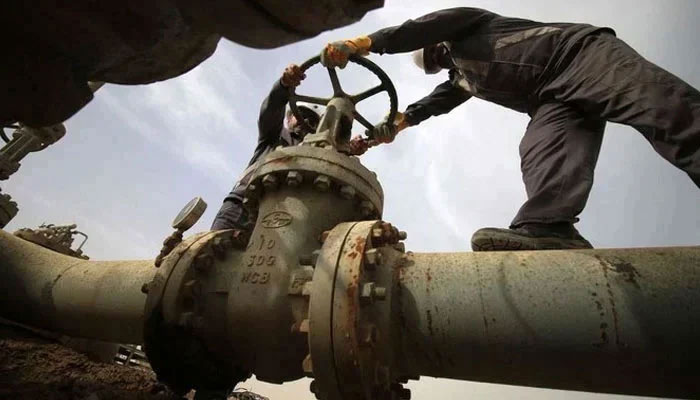CCI to discuss amendments to gas policy
KARACHI: The Council of Common Interests (CCI) is set to address the issue of amendments to the Petroleum (Exploration & Production) Policy 2012, which would allow exploration and production (E&P) companies to sell 35 per cent of indigenous gas to third parties. This move has been opposed by the Sindh government.
The CCI Secretariat has requested detailed information from the Petroleum Division on various issues within the oil and gas sector, including the proposed amendments to the Petroleum Policy. A meeting of the council is expected to take place soon.
The CCI has not convened since January 2024. Recently, the Sindh chief minister wrote a letter to the federal government, urging that a meeting be held in accordance with constitutional requirements.
Earlier this year, in January, the CCI allowed oil and gas E&P companies to sell up to 35 per cent of indigenous gas to third parties, a decision that has faced opposition from the Sindh government.
Besides this, the CCI has requested information about the windfall levy on crude oil. According to an office memorandum, the Petroleum Division has been asked to provide details on the windfall levy, which is currently in litigation in the Islamabad High Court. The federal government has set a target of Rs28 billion in revenue from the windfall levy on crude oil for the current financial year.
The CCI also sought details regarding the import of liquefied natural gas (LNG). Pakistan has been importing LNG to address the shortfall in domestic gas production, which has sharply declined in recent years. However, this year, the country saw a significant drop in gas consumption, leading to the deferral of LNG cargo imports.
Furthermore, the CCI has asked the Petroleum Division to provide details on the Tight Gas Policy 2024, which will be discussed in the next meeting. The policy aims to boost tight gas exploration in a technically and commercially viable manner, as the country’s energy requirements have grown significantly, with demand primarily met through conventional hydrocarbons and imported alternative fuels.
-
 Savannah Guthrie Shares Sweet Childhood Video With Missing Mom Nancy: Watch
Savannah Guthrie Shares Sweet Childhood Video With Missing Mom Nancy: Watch -
 Over $1.5 Million Raised To Support Van Der Beek's Family
Over $1.5 Million Raised To Support Van Der Beek's Family -
 Diana Once Used Salad Dressing As A Weapon Against Charles: Inside Their Fight From A Staffers Eyes
Diana Once Used Salad Dressing As A Weapon Against Charles: Inside Their Fight From A Staffers Eyes -
 Paul Anthony Kelly Opens Up On 'nervousness' Of Playing JFK Jr.
Paul Anthony Kelly Opens Up On 'nervousness' Of Playing JFK Jr. -
 Video Of Brad Pitt, Tom Cruise 'fighting' Over Epstein Shocks Hollywood Fans
Video Of Brad Pitt, Tom Cruise 'fighting' Over Epstein Shocks Hollywood Fans -
 Jelly Roll's Wife Bunnie Xo Talks About His Huge Weight Loss
Jelly Roll's Wife Bunnie Xo Talks About His Huge Weight Loss -
 Margot Robbie Reveals Why She Clicked So Fast With Jacob Elordi
Margot Robbie Reveals Why She Clicked So Fast With Jacob Elordi -
 Piers Morgan Praised By Ukrainian President Over 'principled Stance' On Winter Olympics Controversy
Piers Morgan Praised By Ukrainian President Over 'principled Stance' On Winter Olympics Controversy -
 Halsey's Fiance Avan Jogia Shares Rare Update On Wedding Planning
Halsey's Fiance Avan Jogia Shares Rare Update On Wedding Planning -
 Instagram Head Adam Mosseri Says Users Cannot Be Clinically Addicted To App
Instagram Head Adam Mosseri Says Users Cannot Be Clinically Addicted To App -
 James Van Der Beek Was Working On THIS Secret Project Before Death
James Van Der Beek Was Working On THIS Secret Project Before Death -
 Las Vegas Father Shoots Daughter's Boyfriend, Then Calls Police Himself
Las Vegas Father Shoots Daughter's Boyfriend, Then Calls Police Himself -
 'Hunger Games' Star Jena Malone Shocks Fans With Huge Announcement
'Hunger Games' Star Jena Malone Shocks Fans With Huge Announcement -
 Ex-OpenAI Researcher Quits Over ChatGPT Ads
Ex-OpenAI Researcher Quits Over ChatGPT Ads -
 Prince William Criticized Over Indirect Epstein Connection
Prince William Criticized Over Indirect Epstein Connection -
 'Finding Her Edge' Creator Explains Likeness Between Show And Jane Austin Novel
'Finding Her Edge' Creator Explains Likeness Between Show And Jane Austin Novel




